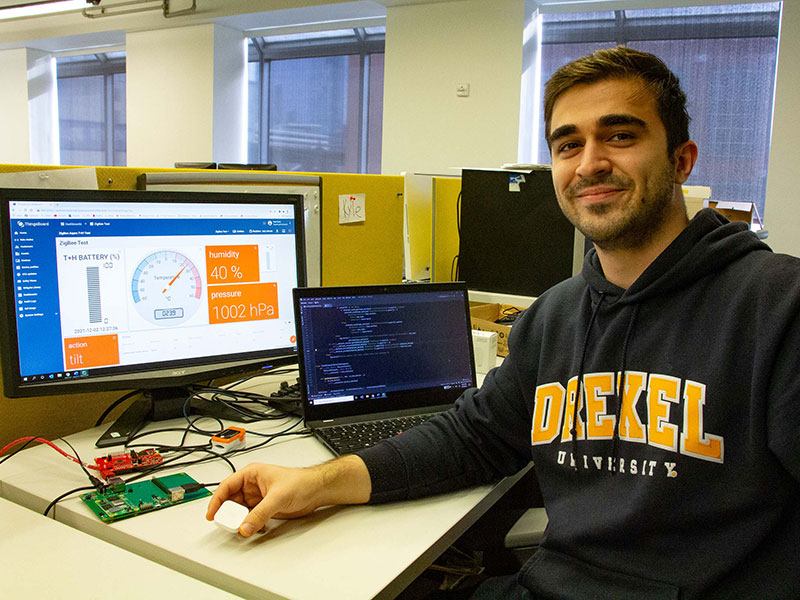The Internet of Things (IoT) has been a boon for researchers, allowing them to conduct experiments and collect data from afar. But as helpful as cloud technology has been for individuals, there is still promise to be realized when it comes to sharing the data with others in a meaningful way.

Rei Ballabani
Rei Ballabani, a fourth-year electrical engineering major, is among the researchers trying to make that connection. For the past eight months, Ballabani has been working in Drexel’s Wireless Systems Lab helping to develop VarIoT, a universal IoT data gateway, as part of the Vertically Integrated Projects (VIP) research program and supported by the Drexel Areas of Research Excellence (DARE) program. The idea behind the gateway is to gather data from different wireless protocols — WiFi, Bluetooth, LoRa, Zigbee and others — and combine it in an easy-to-understand format.
“These wireless systems are terrific at connecting one piece of equipment to the cloud,” Ballabani explains. “But each system has its own way of recording that data. It’s like how your smart doorbell and smart lightbulbs are controlled by different apps. What VarIoT will do is act as a middle ground that can talk with all of the different devices and collect their data into a single place.”
Ballabani has been working with Kapil Dandekar, PhD, E. Warren Colehower Chair Professor of Electrical and Computer Engineering and Director of Drexel’s Wireless System Lab. The project’s ultimate goal is to help build a community of researchers who are using this system to turn Drexel’s campus and surrounding areas in Philadelphia into a living laboratory where data can be collected and shared for a diverse set of applications.
“Imagine that you’re a researcher and you’re trying to gather data on how certain factors in the city impact public health,” Dandekar says. “The idea behind VarIoT is that, for example, data from wearable sensors monitoring the health of people can be easily correlated to environmental data such as urban air quality or heat island temperature because the data is collected and stored within a common framework and not separated by barriers in the wireless protocols used or by the storage of data in proprietary clouds. These same data sets could also be combined with others to enable new applications, some of which we can’t even conceive now. It’s basically making smart campus and city research open source.”
“I’m so happy and proud of that work, and I’m grateful that I got the chance to do it, because in the course of a regular class and even as a beginning engineer at some companies, you don’t get to give that much detailed attention to one project and see it all the way through.”
Rei Ballabani
The VIP program gives undergraduate students an opportunity to work on long-term, interdisciplinary novel research projects in collaboration with faculty and graduate students. Each undergraduate may work on a project for up to three years. Students earn academic credit for their participation in projects, but for Ballabani, the rewards are greater than that.
“I spent this summer designing a printed circuit board, manufacturing it and testing it to see if it could support all these different antennas,” he says. “I’m so happy and proud of that work, and I’m grateful that I got the chance to do it, because in the course of a regular class and even as a beginning engineer at some companies, you don’t get to give that much detailed attention to one project and see it all the way through.”
Ballabani is also working with computer engineers to create software that can read the data that is collected by his circuit board and publish it to the cloud. He says that the opportunity to work across disciplines is something any student should jump at.
“People may be timid and not apply for VIP opportunities, because the project sounds so intimidating,” he says. “Maybe the project brief says it’s about designing a printed circuit board and you haven't even taken a circuit class. But because it's not a one-person effort, you’ll get to learn from someone who’s been in your position before and has already learned it. If there is one thing I have to say to the younger undergraduate students, it would be to apply.”